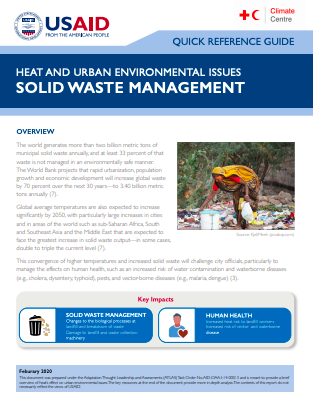Heat and Solid Waste Management
Organization: USAID
Year: 2020

Rapid urbanization, population growth and economic development are projected to increase global waste by 70 percent over the next 30 years—from 2 billion metric tons to 3.40 billion metric tons annually. Heat can affect the biological processes associated with the decomposition of solid waste and the physical operation of landfills, as well as the health and well-being of solid waste facility workers and other populations exposed to solid waste. This convergence of higher temperatures and increased solid waste volume will challenge city officials to manage the effects on human health, such as an increased risk of water contamination and waterborne diseases (e.g., cholera, dysentery, typhoid), pests, and vector-borne diseases (e.g., malaria, dengue).
This quick guide from the USAID-funded Adaptation Thought Leadership and Assessments (ATLAS) project details the impacts of heat on solid waste management and in turn the risks for human health and provides information on the populations and geographic locations most vulnerable to health impacts from exposure to solid waste. The guide also provides actionable recommendations that city officials and donors can take to reduce the risk from heat to solid waste management operations.

